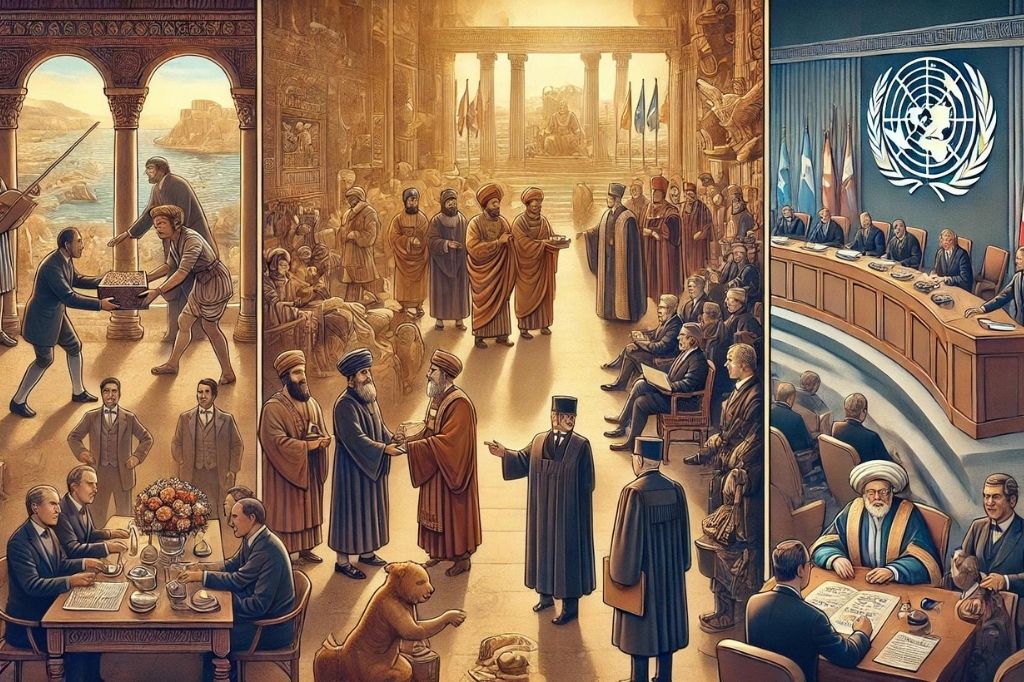From the old messengers of city-states to the advanced representatives of immense countries, the specialty of discretion has been vital in molding world history. The The Historical Evolution of Diplomatic Practices follows how strategy has been the backbone of worldwide relations, working with harmony, producing unions, and frequently turning away conflict. This article investigates the modern dance of strategy through different periods, featuring its effect on worldwide undertakings.
Early Strategy in Antiquated Civilizations
The foundations of tact can be followed back to the old civilizations of Mesopotamia, Egypt, and Greece, where it started principally as a way to forestall struggle and arrange coalitions. Early diplomatic practices were frequently entwined with strict and social customs, pointed toward laying out trust and common regard among divergent gatherings.
Mesopotamian city-states involved marriage coalitions as a diplomatic device, fixing arrangements by offering individuals from illustrious families to one another. This training guaranteed harmony as well as worked with exchange and social trades. Essentially, old Egypt’s pharaohs frequently traded pamper gifts and letters with different rulers, which were as much about showing abundance and power as they were tied in with keeping up with serene relations.
In old Greece, the foundation of the Proxenos framework, where a resident of one city-state went about as a host and promoter for the interests of another city-state, exhibited an early type of diplomatic portrayal that stressed individual connections and correspondence.
The Ascent of Expert Discretion in the Renaissance
The Renaissance time frame denoted a critical evolution in diplomatic practices with the ascent of the occupant representative. This period saw the start of nonstop diplomatic missions, where agents resided in unfamiliar courts, overseeing delayed discussions and social occasion knowledge.
Italy was at the front of this change, especially the city-provinces of Venice and Florence. Venetian ministers were talented in adjusting the interests of their republic while taking part in complex discussions with strong elements like the Ottoman Realm. The conventions and functions created during this time laid the foundation for current diplomatic direct.
The Renaissance likewise saw the codification of diplomatic invulnerability, perceiving the need to lead discretion liberated from the danger of pressure or damage. This guideline stays a foundation of diplomatic regulation today.
Diplomacy in the Period of Empires
As European powers extended their regions across the world, diplomatic practices became fundamental to the organization of realms and the administration of settlements. Discretion in the Period of Realms was set apart by the utilization of deals, economic accords, and some of the time trickery, as states competed for worldwide strength.
The Settlement of Westphalia, endorsed in 1648, is a milestone throughout the entire existence of strategy. It laid out the ideas of state sway and legitimate correspondence between states, rules that turned into the bedrock of worldwide regulation. Following the arrangement, diplomatic missions turned out to be more formalized, with more clear standards overseeing their exercises and status.
During this period, the English and French realms, specifically, created broad diplomatic organizations. They utilized strategy not exclusively to deal with their provinces yet additionally to make cradle zones and really take a look at the impact of opponent domains.
Modern Discretion and Worldwide Institutions
The twentieth century acquainted emotional changes with diplomatic practices with the appearance of worldwide foundations and new correspondence advances. After the overwhelming universal conflicts, countries looked for additional organized ways of overseeing global relations, prompting the production of the Class of Countries and later, the Assembled Countries.
The Joined Nations plays had a critical impact in present day strategy, giving a stage to exchange between countries paying little heed to measure and power. Diplomatic practices have extended to remember multilateral discussions for a large number of issues from security to ecological strategy.
Technological progressions like the message, phone, and the web have changed diplomatic interchanges, making them practically momentary and impressively more mind boggling. The computerized age has presented new difficulties and amazing open doors in tact, including digital strategy and public discretion, which utilizes media and social trades to arrive at unfamiliar publics directly.
Today, negotiators should explore a complicated trap of issues that rise above public lines, from environmental change to worldwide wellbeing emergencies. The center standards of discretion — discussion, portrayal, and correspondence — stay fundamental as could be, yet the way that they are applied is continually evolving. The fate of discretion will probably include a mix of customary techniques and inventive ways to deal with address the worldwide issues of the 21st hundred years.


